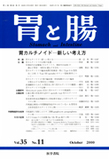Japanese
English
- 有料閲覧
- Abstract 文献概要
- 1ページ目 Look Inside
要旨 H. pglori感染が胃カルチノイド腫瘍(GCT)の発生に関与するかどうかを検討するため,胃体部に発生したGCT症例10例を対象とし,抗壁細胞抗体陰性5例〔PCA(-)-GCT〕と陽性5例〔PCA(+)-GCT〕に分けて,血清学的,組織学的検討を行った.H. pylori感染率は,PCA(-)-GCT例では100%,PCA(+)-GCT例は20%であった.PCA(-)-GCT例は,PCA(+)-GCT例や自己免疫性胃炎ほどではないが,高ガストリン血症とペプシノーゲンⅠ,Ⅰ/Ⅱ比の低下を認め,組織学的検討でもPCA(+)-GCT例と同様の萎縮性胃炎像を呈していた.PCAが検出されなくても,H. pylori感染が,体部腺萎縮を惹起させ,それが起因となって高ガストリン血症を来し,GCTの発生要因になる可能性が示唆された.
We divided 11 patients with gastric carcinoid tumor (GCT) into two groups ; parietal cell antibody (PCA) -positive group and PCA-negative group, and compared the serum gastrin level, pepsinogen Ⅰ, Ⅱ, and the histological characteristics in the corpus mucosa in both groups. All the PCA-negative GCT patients were antiHelicobacter pylori (H. pylori) antibody positive and except for one patient with Type Ⅲ GCT, showed that hypergastrinemia, low pepsinogen I levels and low pepsinogen Ⅰ/Ⅱ ratio were not equal to those in the PCA-positive GCT patients or the patients group with autoimmune gastritis showing Type-A chronic atrophic gastritis. Moreover, the patterns of corpus atrophic gastritis in the PCA-negative GCT patients group mimic those in the PCA-positive GCT patients group. These results suggested that H. pylori infection would induce hypergastrinimia via corpus mucosal atrophy in spite of the lack of classical PCA in serum and would be a factor in the birth and growth of GCT.

Copyright © 2000, Igaku-Shoin Ltd. All rights reserved.


